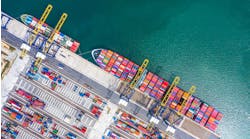The Container Security Initiative (CSI) is a U.S. Customs and Border Protection (CBP) (www.cbp.gov) initiative designed to increase security of U.S. import cargo by providing additional CBP screening capabilities at overseas ports where those cargoes originate. There are currently 41 ports covered by CSI.
Each step importers take to reduce the perceived risk along their supply chain has a corresponding benefit in the speed and ease of entry at the U.S. port of entry. Shipping through a CSI port and joining the voluntary Customs-Trade Partnership Against Terrorism (C-TPAT) reduces the shipper's score in CBP's Automated Targeting System (ATS) and reduces the likelihood of delays or inspections.
Companies become certified (Tier 1) under C-TPAT by submitting security plans and committing to meet minimal security criteria. In addition, companies without a history of significant compliance or law enforcement problems can receive expedited inspection service when containers are pulled for inspection.
When CBP has validated a company's C-TPAT security program (Tier 2), that company receives an even lower target score under ATS.
Tier 3 status under C-TPAT is extended to companies that have cleared a CBP audit and are judged to be following "best practices" that exceed requirements. They also use "smart boxes" — containers with tamper and intrusion detection technology.
The following are the current CSI ports:
Algeciras, Spain
Antwerp and Zeebrugge, Belgium
Bremerhaven & Hamburg, Germany
Buenos Aires, Argentina
Colombo, Sri Lanka
Dubai, United Arab Emirates
Durban, South Africa
Felixstowe, Liverpool, Thamesport, Tilbury and Southampton, U.K.
Gothenburg, Sweden
Halifax, Montreal and Vancouver, Canada
Hong Kong, Shanghai and Shenzhen, China
Kaohsiung, Taiwan
Laem Chabang, Thailand
La Spezia, Genoa, Naples, Gioia Tauro and Livorno, Italy
Le Havre and Marseille, France
Lisbon, Portugal
Piraeus, Greece
Port Klang and Tanjung Pelepas, Malaysia
Pusan, South Korea
Rotterdam, The Netherlands
Santos, Brazil
Singapore
Kobe, Nagoya and Yokohama, Japan


